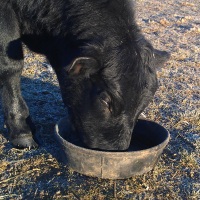
The Food We Eat
 The more I hear in the news about the food we eat, the more convinced I am that things need to change. A hundred years ago we didn't have GMO corn, RoundUp Ready soy beans, RBGH in our milk, and antibiotics in our beef. Nor did we have the prevalent health problems that go along with all of these questionable food items. Consider the sharp increases in the last 20 years in incidence of diabetes. The CDC reports that between 1995 and 2010, the median increase in the 50 states and Puerto Rico was 82.2%1. Something is definitely going on.
The more I hear in the news about the food we eat, the more convinced I am that things need to change. A hundred years ago we didn't have GMO corn, RoundUp Ready soy beans, RBGH in our milk, and antibiotics in our beef. Nor did we have the prevalent health problems that go along with all of these questionable food items. Consider the sharp increases in the last 20 years in incidence of diabetes. The CDC reports that between 1995 and 2010, the median increase in the 50 states and Puerto Rico was 82.2%1. Something is definitely going on.
In this blog, I will occasionally post information about the relative health and safety of the foods we eat. Some of it may shock you, but the intent is to inform you. Information like this is what got me started raising my own beef, chicken, pork, turkey, fruits, vegetables, eggs, and honey. There is a lot to cover, so I'll start with an easy one: grass-fed beef.
Cattle are part of a group of animals with multi-chambered stomachs called ruminants. These animals are very good at extracting nutrients from plant matter that is very tough to digest. Their stomachs help with this process by allowing the plant fibers to break down in the first chamber, or rumen, and forming into cud. The animal then re-chews the cud, further breaking down the particles and aiding in the fermentation that takes place in the rumen. When grass or hay goes through this process, the result is a balanced pH in the cow's stomach and proper digestion.
Since most of us don't grow our own beef, someone has to grow a lot of beef to supply us all with the beef we love to eat. Time and money usually dictate that the cattle are concentrated into small areas and given processed feeds. Here they are raised to market weight on a diet high in corn. This causes them to gain wieght faster, saving the grower money, and it results in tender, well-marbled beef. What's not to love?
The problem is that when you put corn into a cow's rumen, it disrupts the chemistry of fermentation that takes place there, causing a condition known as acidosis. This unbalanced pH also causes E. coli to flourish, leading to an increase in the possibility of foodborne illness. A study by a researcher at Cornell University found that corn-fed cattle have as much as 80% more E. coli in their gut than their grass-fed counterparts.2 This acidic condition can also result in fatty tumors, liver disease, and a number of other potentially fatal illnesses. As a result, theraputic doses of antibiotics are standard practice for cattle in feed lots being finished on grain. This means that, if you buy your beef in the store, it almost certainly has antibiotics in it.
As though that were not enough, consider the impact on the makeup of the meat. The New York Times reported that, by eating grasses and other forage, cattle produce beef that has about twice the Omega-3 fatty acids, and far less dietary cholesterol than corn-fed beef3. Grass-fed beef also has higher levels of vitamins A and E, as well as several antioxidants.
It turns out that raising cattle the way they were meant to be raised produces a lot of health benefits for the consumer. And I haven't even touched on the environmental impacts (I'll save that for another post). So the question is, if you aren't a farmer, what can you do? Find a farmer near you. They are never very far away, and they are probably eating their own product instead of the risky store-bought stuff. Try networking through a local farmer's market or maybe even a local abattoir, if you can find one. Keep at it until you find someone that will sell you a side or a quarter of grass-fed beef. Once you try it, you'll be hooked!
1 Linda S. Geiss, MA, Yanfeng Li, MD, Karen Kirtland, PhD, Lawrence Barker, PhD, Nilka R. Burrows, MPH, Edward W. Gregg, PhD, Div of Diabetes Translation, National Center for Chronic Disease Prevention and Health Promotion, CDC Increasing Prevalence of Diagnosed Diabetes — United States and Puerto Rico, 1995–2010 (cdc.gov, 2006.)
2 Russel, James B. Rumen Microbiology and Its Role in Ruminant Nutrition. (Ithica, NY: self published, 2002.)
3 Parker-Pope, Tara Switching to Grass-Fed Beef (newyorktimes.com, 2010.)